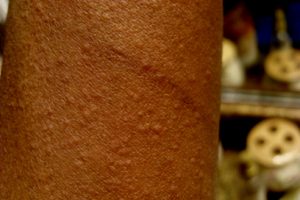The skin is the largest organ in the human body and, for this reason, it is also one of the most sensitive organs and more prone to developing diseases and allergies. Chronic spontaneous urticaria is one of the most bothersome, but many people do not know what it is or what causes it. For this reason, in today’s text, we will address the main issues surrounding chronic spontaneous urticaria. Want to understand more about this type of skin allergy? Then read the text to the end and check it out!
What is Chronic Spontaneous Urticaria?
Also known as CSU, chronic spontaneous urticaria is a type of condition that tends to appear spontaneously, as the name suggests, and presents with redness and itching in isolated parts of the body or, in some cases, all over the body. This itching leads to the appearance of the well-known hives, raised areas with a red border that can cause such intense itching that those who have it may not be able to carry out even the most common everyday tasks. In more severe cases, urticaria can cause angioedema, which is swelling in deeper layers of the skin that causes pain. In any case, it is very important to seek medical help to relieve symptoms and to ensure this condition is treated correctly.
What Causes Chronic Spontaneous Urticaria?
Although it affects around 20% of the world’s population at some point in their lives, and is more common to arise between the ages of 20 and 40, chronic spontaneous urticaria does not have a defined cause. In the vast majority of cases, it arises “out of nowhere” and disappears just as suddenly, potentially returning or not. Studies suggest that some factors—such as genetics or even allergies to certain chemicals and medications—may facilitate the onset of chronic spontaneous urticaria. However, there is not enough research to confirm that these are determining factors for its appearance.
What Are the Symptoms of Chronic Spontaneous Urticaria?
As we have mentioned, the main symptom of chronic spontaneous urticaria is the appearance of hives. These raised lesions, which usually itch intensely, can cause various problems, especially when in public places or where there is no access to a doctor. Another symptom of CSU can be angioedema, which is usually more associated with pain than itching and, in severe cases, can make it difficult for a person to breathe or even swallow food. These symptoms can disrupt someone’s life in many ways and reduce their quality of life. For this reason, it is important to see a doctor as soon as possible for proper treatment.
Main Treatments for Chronic Spontaneous Urticaria
Treatment for chronic spontaneous urticaria should focus directly on symptom relief, since its causes are nearly impossible to identify. For this purpose, doctors may prescribe antihistamines or, in more severe cases where these do not work, stronger medications. It is important to emphasize that you should never self-medicate. Not only is there no guarantee of improvement, since you are not a specialist, but it can also lead to other, sometimes more serious, health problems. Acute cases of CSU usually last a maximum of 6 weeks. However, a good piece of news is that this type of problem usually lasts only between one and five years in a person’s life and rarely recurs. 
When Should You See a Doctor?
As we have said, the symptoms of chronic spontaneous urticaria can lead to consequences that go beyond skin problems. Intense itching can deeply affect a person’s quality of life and, in some cases, can lead to psychological problems such as depression, in addition to interfering with everyday tasks in various ways. Therefore, the recommendation is to see a doctor as soon as the first symptoms of the disease appear. This helps prevent more serious consequences, as well as minimizing the itching and pain the disease may cause. Chronic spontaneous urticaria is a type of allergy that can be quite bothersome and even disrupt your life in different ways. That is why it is very important for you to understand exactly what it is, how it manifests, and especially how to avoid triggering it. Although treatment is very important, it is equally essential to know what triggers this allergy so you can understand your own body and its limits. This way, chronic spontaneous urticaria will not cause you so much trouble.











